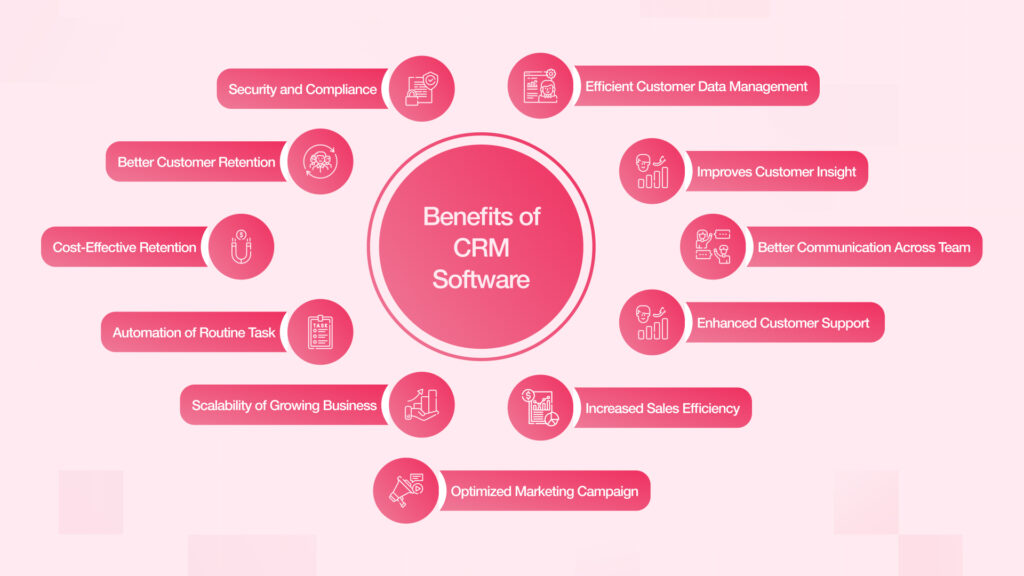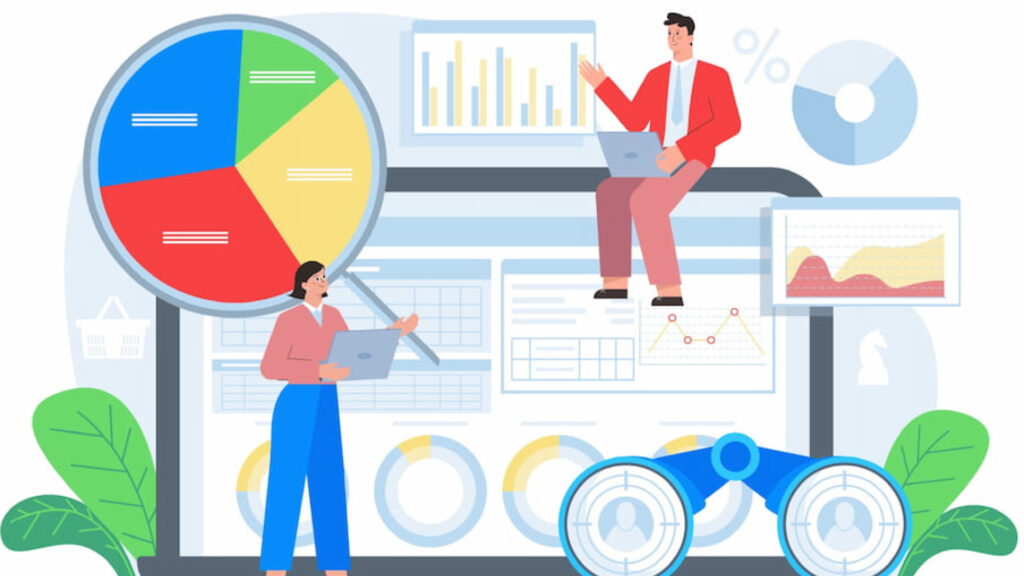Benefits of CRM Software for Growing Businesses
The customer relationship management becomes more complex as the business grows. CRM software makes this a bit easier; it provides benefits of improved customer service, increased sales, and well-organized data, among others. In this article, we examine how CRM tools can enhance efficiency, stimulate growth, and propel businesses forward.
- April 1, 2025
- by Tarun


Today’s Fast-paced business environments require companies to keep good relationships with customers for sustainable growth. As businesses grow, maintaining those relationships presents further complexity. Customer Relationship Management (CRM) software has become an indispensable tool for companies wishing to more optimally coordinate, automate, and analyze customer interactions. In the modern competitive environment, CRM implementation is a strategic need for any growing business, not just an option.
The centralization of all customer-related information in one place, therefore, makes the business easy to understand the clients, easy communication, and make use of the sales. In addition to this, the article will emphasize the need for CRM software for growing businesses by detailing numerous benefits that it can bring with respect to customer management activities and its assistance with business growth.
Benefits of CRM Software

Efficient Customer Data Management
With the growth of a business, the customer’s data also increases exponentially. Managing customers’ information related to their contact details, sub purchase history, communication preferences, and support interactions from multiple points can be overwhelming. CRM software solves this by capturing all information related to customers in one place.
Essentially, CRM systems guarantee instant accessibility of stored customer information, organized in a proper manner. This creates far greater workflow efficiency, as employees can easily retrieve data needed for their work. This translates into enhanced decision-making and reduced errors, thereby increasing operational efficiency. Moreover, the importance of ensuring that customer data stays up to date is also tied to maintaining accurate records. It provides personalized service, both of which are ensured through the CRM.
Improves Customer Insight

Need Reliable partner for custom CRM development?
We Can Help!
Better Communication Across Teams

Team members must keep communication lines open with each other, especially when a business is growing. When the sales team, the marketing department, or even the customer support staff gets to share customer information and synchronize their actions, all to provide a smooth transition for the customer. The use of CRM software has made this whole process more seamless, where all departments can access the same customer information.
For example, the marketing team can use CRM data for a campaign targeting audience preferences. On the other hand, the sales department uses the same data to tailor its approach to sales. In this way, all teams are working towards a single goal. It helps in providing excellent customer experience enough to create loyalty at its best.
Enhanced Customer Support
Customer support is vital to any company, especially with growth. CRM software enables support teams to provide a more effective service by giving them urgent, full information on customers. Thanks to CRM, customer support teams can see a customer’s history, including past issues, and preferences. It also helps in analyzing past interactions, thus enabling them to provide faster and more customized assistance.
Another common feature offered by CRM systems is ticketing/case management to help organize customer queries and ensure that no issues are ever left unattended. Thus, these tools prioritize urgent issues, assign tickets to appropriate team members, and track the resolution. In this way, CRM systems help respond and resolve issues more quickly, thereby adding to customer satisfaction and retention.
One of the well-implemented ticketing solutions is Tiketly, which integrates seamlessly with most CRMs. The strong features of ticket management include a customer support admin panel, instant chat with customers, and emergency support options. They just make a perfect customer experience. With a user-friendly interface, businesses can track, allocate, and manage the tickets. It will be easily accomplished, reducing response time and increasing the efficiency of the operation itself.
Increased Sales Efficiency
CRM software indeed has the power for enhancing sales performance. The centralization of all customer information allows sales teams to better manage leads, interactions, and follow-up of potential opportunities. Detailed customer profiles, including preferences, purchase history, and prior communication, are immediately available, so experiencing greater engagement with customers is possible.
Moreover, these parameters also include automation tools that help save time for the sales team. CRM software allows routine activities such as sending follow-up emails, scheduling meetings, and sending reminders about upcoming tasks to be automated. Such activities now provide salespeople with more time to concentrate on strategic activities like closing deals with clients and building relationships, ultimately leading toward greater sales efficiency and productivity.
Optimized Marketing Campaign
Marketing campaigns are most effective when they are targeted at the right audience with the right message. With the help of CRM software, organizations can segment their customer base based on demography, behavior, and prior purchases. This allows them to create personalized marketing campaigns targeting distinct groups of customers.
With the CRM system, it is also easy to provide performance tracking features that allow businesses to calculate how well their marketing is working. By analyzing the successfulness of a campaign, businesses can fine-tune their strategies to improve future campaigns, resulting in better ROI.
Unify360 is another excellent example of an integration tool with CRM systems, optimizing marketing further. It includes personal notifications and custom search features for data segmentation that help the businesses manage customers’ data. By synchronizing data across different systems and making personalized reports, businesses can make certain data-driven marketing decisions as per customers’ needs.
Scalability of Growing Business
As the size of the business increases, the processes to run it, the management of data, and the customer base also grow. A CRM system provides enough scalability for any business to remain efficient in its operations. The option of CRM software is one which would grow along with the business as more users are added and larger volumes of data are managed, with additional features coming into play as required.
CRM systems provide businesses with a flexible option for scaling their business without downgrading the value and quality of service. From entering new markets to launching a new product to increasing manpower, any dynamically changing requirement can be met by CRM software. Also, most CRM solutions offer cloud capability, allowing them remote community access while eliminating the management burden of hardware infrastructure for scaling.
Automation of Routine Task
CRM Systems can be automated to complete routine tasks such as data entry, emailing, and reminding people about tasks. By taking away these simple tasks, employees can focus on the business’s more strategic, value-added activity.
For example, CRM software can send personalized email campaigns automatically, remind sales teams to follow up on leads, and even update customer information. Therefore, the chances of mistakes become almost negligible. It takes care of all timely actions and boosts the entire efficiency. Automation becomes increasingly beneficial for the growing business, which will be able to even enhance the volume of interaction without increasing the number of employees.
Cost-Effective Operations
Implementing CRM software can significantly reduce costs associated with customer management. CRMs help in the automation of routine tasks making them easy and efficient and bring about savings that come by reducing the time and resources associated with manual intervention. Moreover, they improve the retention of customers, which is typically less costly than getting them new.
In addition, these CRMs can provide data-driven insights that help the management to allocate resources better. This would allow the businesses to budget their marketing and sales programs towards the areas that require the putting of resources to the effect that they will have a more significant impact.
Better Customer Retention
CRM software plays a major part when it comes to building strong, long-term relationships with a business’s customers. A centralized platform for managing customer interactions allows businesses to personalize their services further and create customer experiences that enhance satisfaction.
Besides, the CRM systems help businesses keep an eye on the customer’s behavior and identify potential problem areas before they turn into conflict situations. By taking a proactive approach to assisting their customers and responding to their needs, , businesses can reduce churn and increase loyalty. This is especially relevant to companies experiencing growth, whereby retaining an existing customer is often far less expensive than acquiring a new one.
Looking for a technical partner to help grow your business?
We Can Help!
Security and Compliance
As the business grows, so does the retention and protection practice of sensitive customer data, particularly with the use of CRM software, which stores customers’ information with the appropriate compliance with data protection regulations like GDPR and CCPA.
Features such as encryption, role-based access controls, and secure cloud storage are some of the tools available through CRM systems to protect customer data while keeping businesses protected from possible data breach cases. In addition to these, a CRM provides a company with a reporting tool necessary for following up on customer interactions and how data is received to ensure compliance with those requirements. Thus, they enable businesses’ transparency and accountability concerning customers, building credibility while lessening legal obligations.
Conclusion
A few advantages of CRM software are that they’re necessary for the growing business that wants to manage its customer relationship more effectively. This includes but is not limited to good customer data management and insight, good communication among teams, and good automation of routine tasks. These are vital to businesses looking to scale while maintaining excellent customer service. CRM lets businesses improve processes for sales, create more effective marketing campaigns, and ensures that customers’ interactions at their end are tailored and efficient.
Additionally, the integration of CRM systems with other solutions, such as Tiketly and Unify360, leads to more efficiency in operations. These tools come with features that further augments ticket management, provides segmentation of data, and enhances collaboration, thereby serving as excellent partners to any CRM system. In a world where businesses are in a state of constant evolution, CRM software is a constant towards success: how businesses meet customer expectations and thus achieve sustainability.
 Shopify
Shopify













